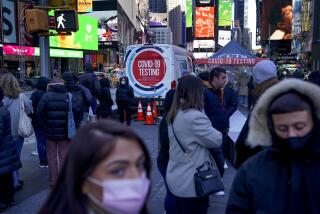New York Ebola patient stable as quarantines begin
- Share via
New York — A doctor being treated for Ebola had received experimental drugs and was in stable condition Saturday as three states — New York, New Jersey and Illinois — ramped up efforts to block the virus’ arrival by mandating 21-day quarantines for medical workers arriving from Ebola-afflicted regions.
The quarantines stirred controversy, with aid groups saying they could hamper efforts to find medical experts to volunteer in the Ebola-affected countries of Liberia, Sierra Leone and Guinea.
More than 4,900 people have died of Ebola in West Africa, and more than 10,000 people have been sickened by the virus, the World Health Organization said Saturday.
New York Mayor Bill de Blasio did not criticize the plan, but he has said that voluntary self-monitoring is sufficient.
“We need medical personnel … to go and help stop this disease,” De Blasio said. “That is how we protect the homeland. Kill the disease dead in its tracks.”
He said Gov. Andrew Cuomo had not notified him of the quarantine plan, which Cuomo announced Friday evening at a news conference with New Jersey Gov. Chris Christie. Later Friday, Gov. Pat Quinn of Illinois followed suit.
Cuomo and Christie said they were spurred to act after concluding that the voluntary self-isolation recommended by the federal Centers for Disease Control and Prevention was not effective.
The CDC guidelines, along with those of most international aid groups, advise people returning from Ebola-afflicted regions to isolate themselves for 21 days, take their temperatures twice daily, and alert medical authorities if they develop a fever or other symptoms of Ebola.
De Blasio defended New York’s first Ebola patient, Dr. Craig Spencer, against suggestions that the 33-year-old physician had been irresponsible by going out with friends and his fiancee after he returned to New York on Oct. 17 from Guinea, where he volunteered with the aid group Doctors Without Borders.
“He’s a doctor who volunteered to go into what is the medical equivalent of a war zone,” De Blasio said.
The mayor and the city’s health commissioner, Dr. Mary Bassett, took their campaign for citywide calm to the heart of Greenwich Village, where Spencer ate at the Meatball Shop restaurant two days before he was diagnosed with Ebola.
Still chewing the last of his meatball lunch, De Blasio stood outside the crowded cafe and described the turnout as a symbol of the city’s flair for dealing with unpleasant surprises, be they tropical storms, blizzards or diseases.
The restaurant owner, Daniel Holzman, standing beside the mayor and wearing a white apron, said he was nervous that the restaurant’s sudden place in the midst of an Ebola story would scare people away. “But we had a line down the block,” Holzman said, as diners snapped pictures of the sidewalk news conference going on outside.
Bassett said Spencer had received the experimental anti-viral drug brincidofovir, which does not have FDA approval but has been used on other Ebola patients who recovered. She said that although Spencer remained stable, people with Ebola often get sicker before showing signs of recovery.
Bellevue Hospital, where Spencer is being treated, released a statement underscoring Bassett’s words. It described Spencer as “entering the next phase of his illness, as anticipated, with the appearance of gastrointestinal symptoms.”
But it also said Spencer was “awake and communicating.” It said Spencer’s fiancee, who had been in quarantine in the hospital, was released and would spend the remainder of her quarantine period in the couple’s newly decontaminated apartment.
Two friends of Spencer, who also had direct contact with him, also are under quarantine. The friends and the fiancee show no symptoms and will be released from quarantine early next month, assuming they remain healthy.
Starting Saturday, Bassett said, the city would begin more hands-on monitoring of all travelers arriving from Guinea, Liberia, and Sierra Leone. For three weeks, such travelers, whose names are available from passenger manifests, will receive daily phone calls or home visits from healthcare workers to ensure they are not developing Ebola symptoms, Bassett said.
De Blasio noted that the state-mandated quarantines would not rope in every traveler coming from West Africa — only those who have had direct contact with Ebola patients.
He and Bassett also made clear, though, that they did not think Spencer had done anything irresponsible in not totally isolating himself after he came home. They said Spencer did not become symptomatic, and hence contagious, until Thursday and that he alerted medical authorities immediately thereafter.
It was unclear if people sent into quarantine will be held in hospitals or elsewhere. Officials have said details will be worked out on a case-by-case basis, depending on where individuals live and what facilities are available to house them.
The first person to be put in quarantine was a nurse who arrived at Newark’s Liberty International Airport on Friday night after treating Ebola victims in Sierra Leone.
The nurse, Kaci Hickox, described her experience in a first-person account that appeared in the Dallas Morning News. She complained of a state of confusion among health workers and other officials who questioned her when she arrived and then ordered her into quarantine at a Newark hospital.
Hickox has tested negative for Ebola but will remain in quarantine for 21 days.
Christie, asked during a visit to Iowa about Hickox’s complaints, called the case a “difficult situation” and said Hickox is “someone who has been trying to help others.”
But, he said, “my first and foremost obligation is to protect the public health and safety of the people of New Jersey. So I’m sorry if in any way she was inconvenienced, but inconvenience that could occur from having folks that are symptomatic and ill out amongst the public is a much, much greater concern of mine.”
Twitter: @tinasusman
More to Read
Sign up for Essential California
The most important California stories and recommendations in your inbox every morning.
You may occasionally receive promotional content from the Los Angeles Times.











